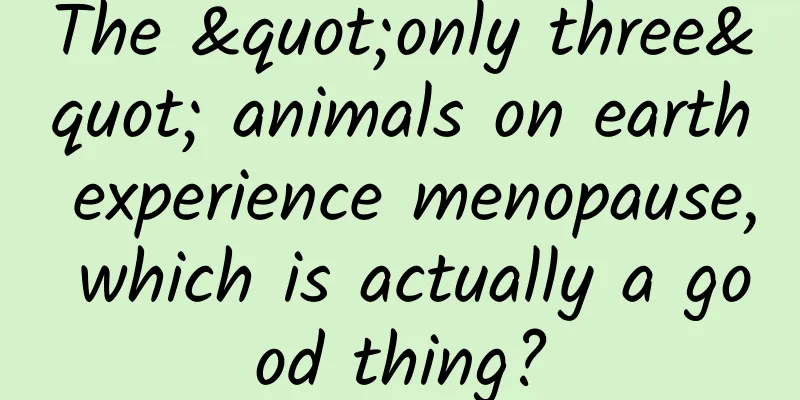The "only three" animals on earth experience menopause, which is actually a good thing?

|
Who is best suited to write about the topic of "menopause"? Naturally, women who have experienced menopause, such as Susan P. Mattern, a historian at the University of Georgia, who just wrote a book, "The Moon's Slow Climb: The Science, History, and Meaning of Menopause," published by Princeton University Press. When you think of menopause, what comes to mind? Permanent loss of fertility? Hormone disruptions? Irritability? Hot flashes? Night sweats? Heart palpitations? Insomnia? Anxiety and depression? Menopause seems to be a curse, or at least a disease. Health product advertisements tell you that menopause requires "calming down the mind" and "relieving symptoms." Doctors also regard menopause as something that needs to be treated and controlled, prescribing hormone supplements to menopausal women one after another. Susan Mattern wants to challenge the "common sense" about menopause. Is menopause really a disease? Is it possible that women's early loss of fertility is not a "mistake" but an "advantage"? "The Moon's Slow Rise: The Science, History, and Meaning of Menopause" Source: ISBN: 9780691171630 Menopause is an evolutionary advantage Of all the animals in the world, only three are known to experience menopause - killer whales, short-finned pilot whales, and humans. The rest of the animals can reproduce until they die. Take our closest relatives, chimpanzees, for example. The fertility of chimpanzees peaks at 25 to 30 years old, then gradually declines, reaching zero at around 50 years old. But 50 years old is almost the life limit of chimpanzees. In the wild, the natural life span of chimpanzees is about 40 years, and only a few chimpanzees can live to 50 years old. Chimpanzees do not have menopause. The day they lose their fertility is almost the day they die of old age. But human females still have a long lifespan after losing their fertility, not just one or two years, but more than ten or twenty years. Most women lose their fertility around the age of 45 (no longer have children), have their last menstruation around the age of 50, and can live up to 70 years. In other words, after losing their fertility, women still have one-third of their lives to live. Could it be that "women were not supposed to live that long, and modern medicine has given us an extra twenty years"? Research shows that this is not the case. Among the Hiwi hunter-gatherers in Venezuela, women who live to 45 have a 50% chance of living another 25 years. Michael Gurven and Hillard Kaplan studied the population of hunter-gatherer societies and concluded that although hunter-gatherers did not have a stable source of sufficient food, modern immunizations, public health measures, and modern medical services, almost a quarter of them still lived to become grandparents and lived another 15 to 20 years thereafter. Living a long life after giving birth is the natural setting of human women, not a life-extending trick of modern medicine. So the next question is, why did human females (and killer whales and short-finned pilot whales) evolve this setting? Intuitively, evolution favors individuals that leave more offspring. If you can live to 70, why not keep having children until you are 70? Wouldn't it be more likely that you would leave many offspring? Image source: pixabay In the case of killer whales, the answer is obvious - the post-menopausal killer whale grandmother is a powerful protector of the family. Female killer whales are fertile between the ages of 15 and 40, but can live for a long time after losing their fertility, and can live to 80 or even 90 years old. In the past few decades, the killer whale grandmother has led the killer whale group to hunt salmon - in the vast ocean, it is not easy to find a missing plane, but the killer whale grandmother can rely on her rich experience to lead the children to find the elusive school of fish. In other aspects of life, the killer whale grandmother also provides guidance and assistance to the children. There have been observations of the killer whale grandmother helping her daughter to give birth by pulling the dorsal fin. Once the orca grandmother is lost, her children - even if they are already adults - will be severely affected. In the year after the orca grandmother died, her daughter was 2.7 times more likely to die than when she was alive, and her son's death was directly increased by 8 times. Although the post-menopausal killer whale grandmother no longer gives birth, she uses her wisdom and abilities to increase the possibility of genetic continuation in the family. The same is likely true for human women after menopause. Susan Mattern proposed that menopause is not a disease or a mistake, but a natural human life cycle and reproductive strategy, and may even be one of the important reasons why "humans are so successful." We humans have several major characteristics: long childhood, long life span, short birth intervals, intensive investment in offspring, and multiple people are allowed to take care of children... These characteristics are all related to menopause. These characteristics combined give us humans unique competitiveness and ultimately allow us to conquer the earth. Grandmother Conquered the World The person who first proposed that " grandmothers are the core competitiveness of human beings " was a female anthropologist, Kristen Hawkes. Before the emergence of the "Grandmother Hypothesis", the dominant theory was the "Hunter Hypothesis" - which believed that excellent hunters among men promoted human evolution. In order to hunt, they chose to stand upright on two feet to free their hands, developed complex hunting defense tools, and provided nutritious meat, which made the human brain continue to grow. As the human brain grew larger, it became difficult to have children, so children had to be born prematurely. Premature children are fragile and need care, so women have to take care of them. As a result, gender division of labor emerged, with men responsible for providing food and women responsible for housework and taking care of children. Men's investment needs to be rewarded, so they need to ensure that the children are their own, so humans began to form monogamous relationships... Yet when anthropologist Kristen Hawkes observed the Hadza, a hunter-gatherer tribe in Tanzania, she found a different pattern of provision— not men providing and women consuming, but adults providing and children consuming. Image source: pixabay Women with breastfeeding children do spend less time foraging, but they do not forage at all. In addition to breastfeeding women and young children, postmenopausal women, women of childbearing age, and even children and adolescents participate in foraging. Men do go hunting and bring back prey, but the harvest is not stable. The fruits, baobab fruits, underground tubers and honey brought back by women and children are an important source of food. Without the food brought back by women, it would be impossible to feed the existing children. Menopausal women spend a lot of time foraging for food, and they can also handle those underground tubers that are difficult to find and need to be processed in a complicated way before eating. In addition, menopausal women are the main force to assist women of childbearing age in raising children. Every lactating woman has at least one menopausal woman to help. We humans have a long childhood, which gives us the opportunity to learn skills and develop intelligence. However, a long childhood also means that children need to be supported for a long time. Infants and young children are particularly fragile and prone to death, and often require multiple adults to work together to take care of them. No child is supported by his parents alone. Relatives and even the entire tribe will help to support and care for him. Take the Efé people, a hunting and gathering tribe in the Democratic Republic of the Congo, for example. When babies there reach the age of one, they have an average of 11 adult caregivers. When the proportion of children in a group is too high, there are not enough adults to support the children, and the child mortality rate will inevitably rise rapidly. In the long history of mankind, "population aging" is not the most terrible thing, but "large-scale aging of the population" is terrible. (Why do only women have menopause, while men can reproduce until they die of old age? It may be because the key bottleneck of "population growth" is entirely on women. Imagine that one tribe has one man and one hundred women, and another tribe has one hundred men and one woman. How will the population of these two tribes change? In the evolutionary process, changes in female fertility are the key, and changes in male fertility are not that important.) Menopause is the "family planning" evolved by human women. In the decades after menopause, women no longer give birth to young, and their ability to collect food is at its peak. Countless menopausal grandmothers, aunts, and even distant female relatives provide a large amount of "food surplus" and "labor surplus", most of which are invested in the next generation to help support the children born by women of childbearing age in the tribe. In addition, they also take care of the elderly, the weak, the sick, and the disabled, adopt orphans, and mediate conflicts. Just like "raising children with two working couples is less stressful", when there are enough menopausal women in a tribe, the pressure of parenting is greatly reduced and they have stronger survival ability. Not only that, in cooperative parenting, humans naturally develop various cooperation and social skills, and are therefore better able to unite to achieve goals and resist foreign enemies. In bad years, the labor of menopausal women makes it easier for existing children to survive, thus stabilizing the population. In good years, menopausal women help feed children, allowing women of childbearing age to quickly wean and give birth to new children, thus rapidly expanding the population. The longer menopausal women live, the more they know. When anthropologist Jared Diamond studied birds in New Guinea, he often turned to the local elders - those people were living knowledge bases, remembering the birds and animals they had seen and knowing how to survive droughts, floods and famines. Because of the existence of a large number of menopausal women, human ancestors could feed the next generation no matter what the climate changed or where they migrated. Even in modern times, menopausal grandmothers are still a strong guarantee for children's survival. In rural Finland and Canada in the 18th and 19th centuries, for every 10 years that menopausal women over 50 lived, their descendants had an average of 2 more grandchildren. In rural Gambia in the mid-20th century, children whose maternal grandmothers were still alive were 10% more likely to live to the age of 5. Image source: pixabay Until 40,000 to 50,000 years ago, there were many kinds of ancient humans in the world - Neanderthals, Denisovans, and Red Deer Cave people. But now, all ancient humans except Homo sapiens have disappeared. According to current research results, other ancient humans have large brains and can use tools, and no significant differences have been found in genes related to cognition. Susan Mattern suggested that perhaps the real advantage of Homo sapiens lies in the life cycle and reproductive strategy - menopause and cooperative parenting, and these two strategies are not everywhere. At least chimpanzees have not adopted either. Female chimpanzees do not have menopause and will not cooperate in raising children, but will kill other chimpanzee children whenever they have the chance. Now there are 7 billion Homo sapiens all over the world, while chimpanzees are on the verge of extinction. Perhaps the difference in reproductive strategy is one of the reasons. Lots of fun time after menopause If the loss of female fertility was not a curse but a blessing, and even the key to Homo sapiens’ global conquest… then why do we now view menopause as a disease? To answer this question, Susan Mattern examined the views of menopause in different eras and cultures, and finally found that many cultures did not have the concept of "menopause" at all - people certainly knew about menopause, but they did not create a special word for "a series of symptoms that come with menopause." In many places, women even think that menopause is good - no longer have the heavy burden of raising young children, no longer need to deal with troublesome menstruation every month, and no longer need to consider taboos related to menstruation. As they age, women's status rises, and their energy and intelligence are still at their peak. Menopause does not mean "withering", but instead opens the freest and most beautiful period in life. The modern concept of "menopausal syndrome" probably began to appear in the 18th century. Researchers asked postmenopausal women to report their symptoms - there is nothing wrong with self-reporting. However, if there is a lack of controlled studies on younger women and men of the same age, insomnia, mood swings, and even pain and discomfort caused by normal aging, which most people experience, may be regarded as "special phenomena caused by menopause." Symptoms are extremely subjective, and the environment, beliefs, expectations, personal experiences and mood swings will change people's reports of "symptoms." In addition, society's view of menopause will also affect menopausal women's view of themselves and the stage they are going through. When society believes that menopause means that women are "dry, castrated, and have lost their sexual appeal", menopausal women will naturally feel anxious and depressed. If menopausal women get angry about something, and people around them do not take her anger seriously, but frivolously attribute it to "she is in menopause", this will undoubtedly make menopausal women even angrier and fall into deeper entanglement and self-doubt. Image source: pixabay After all, many studies on menopause may have a presupposed premise - menopause is a disease, a lack of hormones. However, should the hormone levels of childbearing age be the "normal standard" for a lifetime? No one would think that a 5-year-old girl who has not yet developed is "hormone deficient", so why can't low hormone levels in menopause be "normal" at this stage of life? Many hormone replacement therapies for menopause do bring some slight benefits, such as strengthening bones, reducing hot flashes and night sweats, etc., but they also cause a slight increase in risks - such as an increased risk of endometrial cancer, breast cancer, and blood clots. Overall, hormone supplementation seems to have neither great benefits nor risks. If we do not regard menopause as a disease, we should re-examine whether these interventions are worth promoting. Perhaps we should think of menopause as a "cultural syndrome." Some menopausal symptoms do exist, but cultural views of menopause also affect the physical and mental state of menopausal women. Negative expectations of menopause will bring additional attention to symptoms, which in turn makes the symptoms more unbearable... Menopausal symptoms certainly have a physiological basis, but psychological and social factors also play a role. When we look at menopause with anxiety about decline, all this may be made worse. Menopause is not the end of life. In evolution, menopause is the least burdensome and most productive stage for women. Menopausal women were and are the backbone of human society. Susan Mattern's book "The Moon Rises" is titled after the poet Tennyson's "Ulysses" - "The long day is about to end, the moon is slowly climbing, and the roar of the sea is echoing all around. Come, friends, it is not too late to discover the new world." This is a poem about middle-aged people, and also about the menopause of women. Menopause is a broad, open and energetic stage in life. The long day is about to end, but the slowly rising moon will illuminate a new journey. References [1]Mattern, S. (2019). The slow moon climbs: the science, history, and meaning of menopause. Princeton: Princeton University Press. Planning and production Source: Yanggezhiren (ID:yanggezhiren) Author: You Shiyou Editor: Bai Li |
<<: In the world created by “screens”, the word “natural” is becoming less and less common?
Recommend
If your body has these 4 symptoms, it means you are very healthy!!!
References [1] Keendjele TPT, Eelu HH, Nashihanga...
Can fatty liver be cured by starving for two days a week? Can sun-proof clothing moisturize, cool down and repel mosquitoes? Here comes the June rumor list →
1. An outbreak of "man-eating bacteria"...
The only difference between a high-conversion landing page and a low-conversion landing page is the underlying logic!
Landing page planning has always been a headache ...
The dog that was almost euthanized is now a hero in the fight against poaching
There is always a gray mood hanging over the shel...
Why do Chinese people love growing vegetables so much?
On October 12, 2024, Shi Jun, a Ph.D. in botany a...
A serious fire broke out in a 42-story building in Hong Kong, China! How much time is left for the trapped people to escape?
On March 2, 2023, a fire broke out in a 40-story ...
How to choose a good mini program development company?
With the continuous advancement of Internet techn...
2014 Global Mobile Game Industry White Paper
Fast-growing global mobile gaming market In 2014,...
Design like a psychologist! 5 practical tips to control user behavior
Have you tried various design strategies and meth...
Short video traffic from 0 to 100 million, you only need to learn these 3 steps
At present, the training on traffic improvement i...
HarmonySpace Hongmeng cockpit large-scale OTA upgrade brings users a smarter interactive experience
Since October, the Hongmeng cockpit based on Harm...
Use artificial intelligence to "talk to" them. When will humans be able to chat with animals?
Your browser does not support the video tag Autho...
World Pain Relief Day | You don’t have to endure some pain! Let’s learn the truth about “labor analgesia”
As we all know, the pain of childbirth experience...
Taking daily chemicals as an example, how to make your information flow copy stand out?
The products in the daily chemical industry gener...









